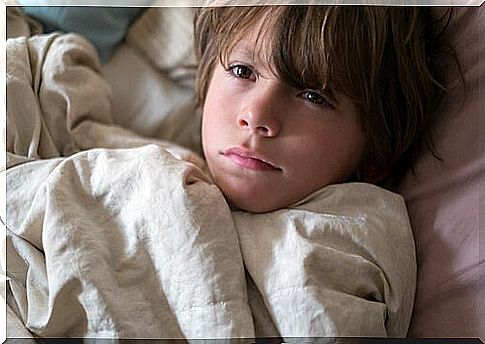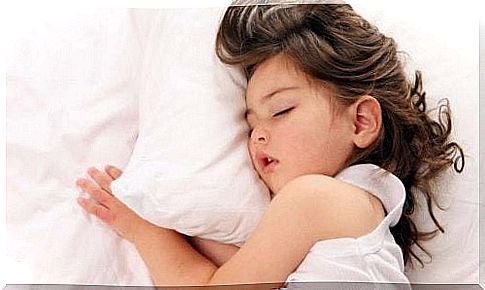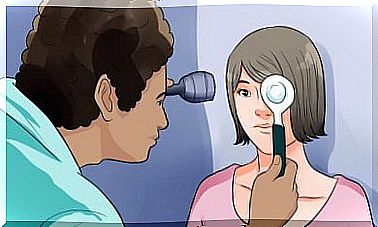Childhood Insomnia: Why And How To Overcome It

Sleep disorders have become commonplace today. Although everyone relates them to adult life, stress and problems with work, love and health, they can also suffer the little ones. Next, we will review the causes and consequences of childhood insomnia.
If it’s inconvenient to fall asleep, anyone can have a bad night. However, if this is repeated several times or if it lasts for a long period of time, it is time to address its possible causes.
The origin of childhood insomnia can be very diverse. It will depend on the stage of development in which the child is, his health, the context in which he lives and his habits. Its consequences, likewise, may be different, but they all deserve quick and efficient treatment.
Causes of childhood insomnia
Insomnia is a common problem during the first years of life. In many cases, it takes a baby a couple of months to adjust his biological clock to get into the habit of sleeping at night.
In addition, as long as there are no health problems that cause pain or discomfort, they also need the warmth and affection of their parents. If they are close to them, they will be calmer and calmer, which will favor their rest.
Already in childhood the change in lifestyle makes the reasons for insomnia more varied. Here we review the most common:
- Family history : if the parents have suffered from insomnia problems, it is likely that the child also has them. It is a trait that is inherited genetically.
- Bad habit formation : education is not only about the intellectual or the manners. It also includes habit formation. If older people show inappropriate sleeping habits, children will follow suit.
- Influence of the context: if the child is allowed to stay watching television or playing with the console, mobile or computer until late, their rest will be greatly affected. Also, if he sees that other family members (siblings or parents) stay up late, he will want to do it too.
- Emotional problems : childhood insomnia can be a symptom of a severe emotional disorder, such as depression, anxiety or stress. In this case, it is extremely important to deal with the problem as soon as possible to avoid serious health problems in the future.
- Physical problems : finally, the child may have trouble sleeping due to muscle aches, stomach aches, headaches, or any other physical discomfort.
In addition, in adolescents, we must not ignore the possible consumption of substances such as alcohol or tobacco, with considerable harmful effects on rest.

Consequences of childhood insomnia
Having trouble falling asleep can cause the following consequences in children:
- Fatigue and tiredness: the logical consequence, given the lack of rest during the night.
- Irritability: if we all feel bad about not getting enough sleep at night, imagine what it means for a child, a stage in which tantrums and anger are the order of the day.
- Development problems: while we sleep, the cells of our body take advantage of the fact that many functions are “off” and regenerate themselves. If this does not happen, the metabolism and the production of hormones necessary for the normal development of the infant could be affected.
- Mental disorders: just as we said that depression and anxiety can cause insomnia, the opposite can also be the case. Not being able to sleep and having to face days with low energy (and spirits) can be very traumatic for children. Rest is essential to maintain mental health.
How to treat childhood insomnia?
One of the first preventive actions against the appearance of sleep disorders in children is to go to the pediatrician to rule out that it is caused by any pathology.
On the other hand, there is no universal and foolproof method to treat childhood insomnia. Rather, it must adapt to the characteristics and particularities of each situation.
However, once physical or psychological problems have been ruled out, there are a couple of techniques that we can implement to promote good rest. First of all, we must prepare the environment: a dark room, without distractions and calm. We can also add an object of value for the child that transmits security and peace. It can be a doll, for example.

It is also important to develop healthy rest habits. Here we include setting a time for dinner and another for going to sleep that are respected day by day, exercising during the day to expend energy, limiting contact with mobile phones and computers at least one hour before sleeping and also promoting from the example the corresponding and necessary rest. If he likes, you could also read him a bedtime story to help him relax.
Finally, if this does not work, more specific studies can be carried out, such as a polysomnography, which allows recording of the body’s functions and its functioning during sleep.
By way of conclusion, then, we can point out that childhood insomnia can be caused by both physical or psychological disorders and poor habit formation. In either case, prompt correction of the problem is extremely important to enable a full and healthy life for the child.










